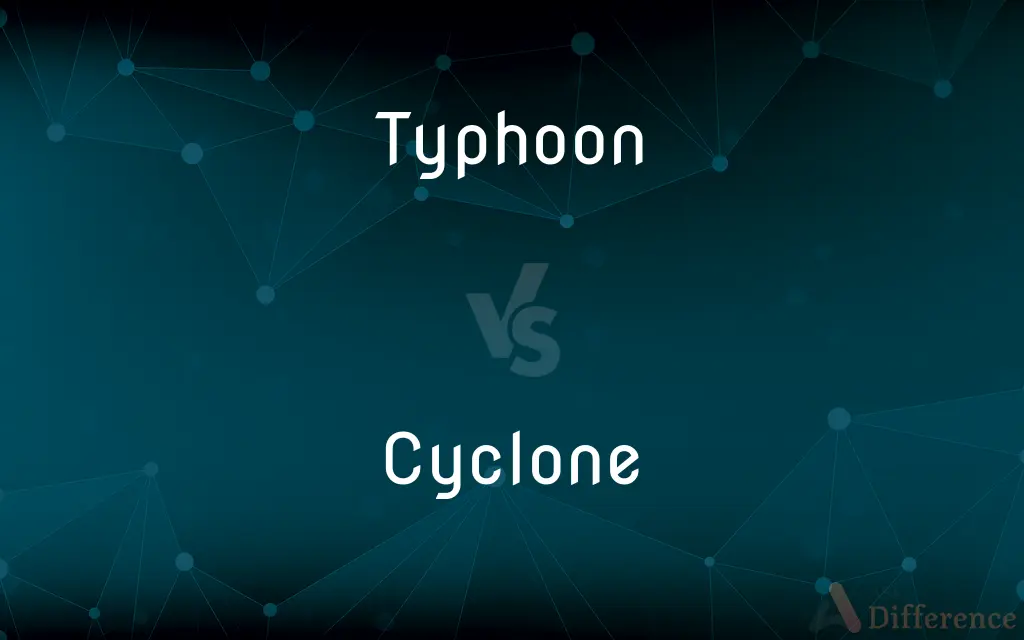Typhoon vs. Cyclone — What's the Difference?

Difference Between Typhoon and Cyclone
ADVERTISEMENT
Compare with Definitions
Typhoon
A typhoon is a mature tropical cyclone that develops between 180° and 100°E in the Northern Hemisphere. This region is referred to as the Northwestern Pacific Basin, and is the most active tropical cyclone basin on Earth, accounting for almost one-third of the world's annual tropical cyclones.
Cyclone
In meteorology, a cyclone () is a large scale air mass that rotates around a strong center of low atmospheric pressure, counterclockwise in the Northern Hemisphere and clockwise in the Southern Hemisphere as viewed from above (opposite to an anticyclone). Cyclones are characterized by inward-spiraling winds that rotate about a zone of low pressure.
Typhoon
A tropical cyclone occurring in the western Pacific or Indian Oceans.
Cyclone
A system of winds rotating inwards to an area of low barometric pressure, with an anticlockwise (northern hemisphere) or clockwise (southern hemisphere) circulation; a depression.
Typhoon
A weather phenomenon in the northwestern Pacific that is precisely equivalent to a hurricane, which results in wind speeds of 64 knots (118 km/h) or above. Equivalent to a cyclone in the Indian Ocean and Indonesia/Australia.
ADVERTISEMENT
Cyclone
An atmospheric system characterized by the rapid inward circulation of air masses about a low-pressure center, usually accompanied by stormy, often destructive weather. Cyclones circulate counterclockwise in the Northern Hemisphere and clockwise in the Southern Hemisphere.
Typhoon
(intransitive) To swirl like a hurricane.
Cyclone
A violent tropical storm, especially one originating in the southwestern Pacific Ocean or Indian Ocean.
Typhoon
A violent whirlwind; specifically, a violent whirlwind occurring in the Chinese seas.
Cyclone
A violent rotating windstorm, especially a tornado.
Typhoon
A tropical cyclone occurring in the western Pacific or Indian oceans
Cyclone
Any of various devices using centrifugal force to separate materials.
Cyclone
(broad sense) A weather phenomenon consisting of a system of winds rotating around a center of low atmospheric pressure
Cyclone
(narrow sense) Such weather phenomenon occurring in the South Pacific and Indian Ocean
Cyclone
A low pressure system.
Cyclone
(informal) The more or less violent, small-scale circulations such as tornadoes, waterspouts, and dust devils.
Cyclone
A strong wind.
Cyclone
A cyclone separator; the cylindrical vortex tube within such a separator
Cyclone
To separate using a cyclone separator.
Cyclone
To storm as a cyclone.
Cyclone
To whirl in spirals as a result of a cyclone or whirlwind-like force.
Cyclone
To storm wildly; to be in a frenzy.
Cyclone
A violent storm, often of vast extent, characterized by high winds rotating about a calm center of low atmospheric pressure. This center moves onward, often with a velocity of twenty or thirty miles an hour.
Cyclone
In general, a condition of the atmosphere characterized by a central area of pressure much lower than that of surrounding areas, and a system of winds blowing inward and around (clockwise in the southern hemisphere and counter-clockwise in the northern); - called also a low-area storm. It is attended by high temperature, moist air, abundant precipitation, and clouded sky. The term includes the hurricane, typhoon, and tropical storms; it should not be applied to the moderate disturbances attending ordinary areas of low pressure nor to tornadoes, waterspouts, or "twisters," in which the vertical motion is more important than the horizontal.
Cyclone
A tornado. See above, and Tornado.
Cyclone
(meteorology) rapid inward circulation of air masses about a low-pressure center; circling counterclockwise in the northern hemisphere and clockwise in the southern
Cyclone
A violent rotating windstorm
Share Your Discovery

Previous Comparison
Assignee vs. Assigns
Next Comparison
Soupspoon vs. Tablespoon














































